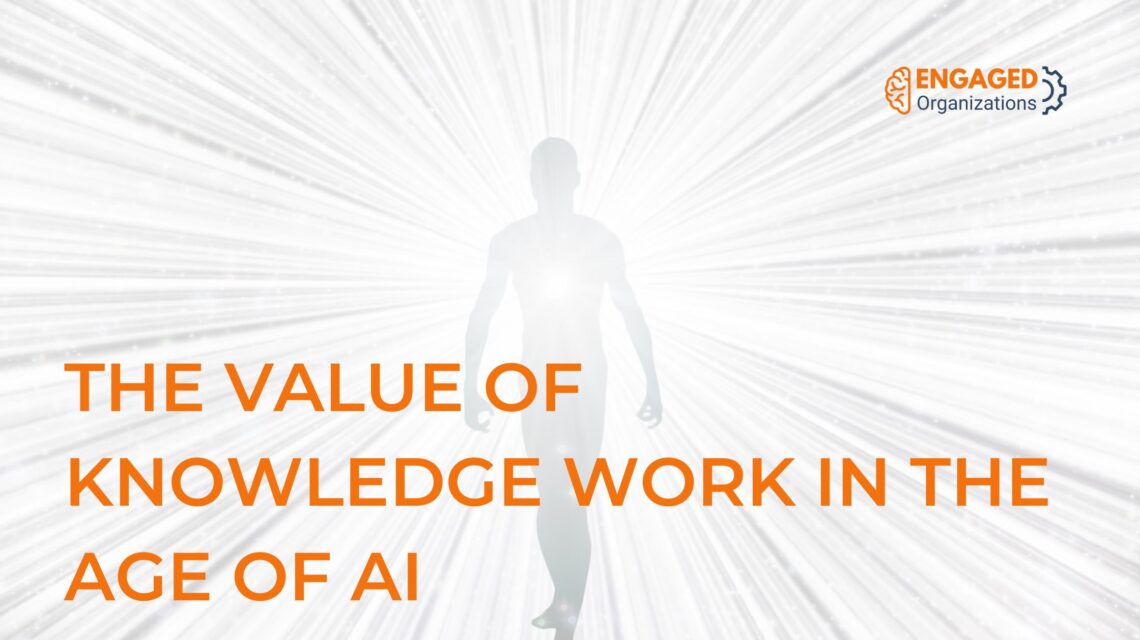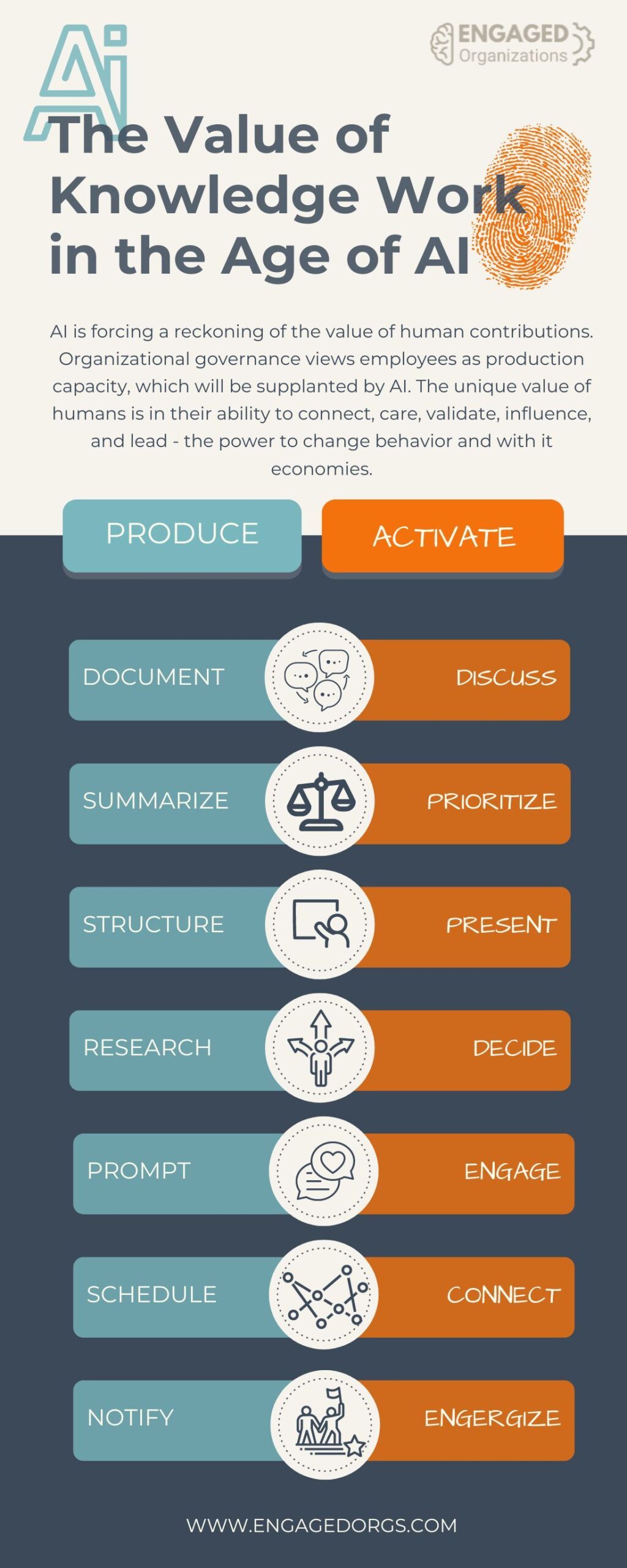The value of knowledge work in the age of AI will force a reckoning; a reckoning in how we work but more fundamentally in how we understand and account for value. Today, our systems are based on the assumption that production = value. We value creating software more than we value caring for children. We value big houses more than we do good neighbors. We value documents more than conversations. We value doing more than being.
AI will optimize these systems in ways that will break us and usher in our own destruction – if we let it. Not because of any inherent problem with the technology itself, although there are plenty of issues there, too, but because it will produce more than humans can ever absorb while destroying the very things we require to thrive – connection, reflection, learning, creativity, and joy. Instead, our current governance and accounting model would lock us into a futile effort to compete with AI. It is a losing proposition.
Organizational Systems Do Not Value Humans
Whether you look at a corporate balance sheet or a homeowner’s insurance policy, there is no asset line item for people. Employees are only liabilities for organizations – their compensation and overhead (a.k.a fully burdened headcount). For a homeowner, if a house burns down and takes its inhabitants with it, there is no financial compensation for that loss.
There is recognition that people have value, but it is assumed to be intangible. Putting a financial value on a person is also considered unsavory. That is OK when we collectively agree to standards and ethics regarding the treatment of people, but it also allows for rampant abuse and mistreatment, which has only accelerated as automation has increased because systems don’t observe ethics.
At the same time, Jack Welsh ushered in an era where companies are managed like financial instruments, with a brutal approach that ignores human value. As that has happened, CFOs and financial institutions have gained influence. So-called strategic decisions are often instead opportunities for financial arbitrage; look no further than private equity and venture capital firms, which control an increasing amount of the economy. This transition has destroyed any semblance of loyalty or care for employees. If anything, companies have outsourced so much of their operations because it allows them to take on and discard employees without any obligation or commitment to them.
It is unfashionable to care.
Out of Sight, Out of Mind
If you ask executives if employees have value beyond what they produce, most will acknowledge that not all employees are created equal. Those who collaborate, communicate well, and energize others are more valuable than those who do not. Look no further than the salaries of those executives.
If you ask those same executives about the financial value of those skills, they will likely say that it is impossible to calculate. If you push them, they might say successful employees are 2x (or some variable) as valuable as average employees, especially knowledge workers.
However, the value of expertise and knowledge is not calculated or documented in any accounting system. Employees with experience and expertise often earn more, but in accounting terms, that increases organizational liability and makes them more likely to be laid off. Ironically, on the balance sheet, advanced expertise increases organizational risk.
The intangible value of employees is not documented or easy to compare with what they produce. When it is rolled up and evaluated by accounting teams, it is irrelevant. It is out of sight and out of mind and becomes a vague abstraction for executives making decisions.
Why Do We Need Humans Anyway?
If the value of employees lies solely in what they can produce, why do we need them anyway?
As generative AI comes barreling through our economy, this is the existential question asked by some and the tantalizing opportunity for others.
Why don’t we think about employee value differently?
We inherited many of our financial and accounting practices from the plantation system. Caitlin Rosenthal’s excellent book on the history of organizations, Accounting for Slavery, was eye-opening. In it, she explains why so many of our seemingly arbitrary or inconsistent corporate practices exist. Quarterly reporting, which seems arbitrary, was based on the shipping schedule between plantations and their absentee owners in England. The gap in reporting employees as assets was created when slavery was abolished, and enslaved individuals were no longer considered property and were only considered for their ability to produce.
We inherited these accounting practices and, with them, assumptions about work. Even as work has become less concrete and tangible, we still think about and structure it around a production mentality. This mentality extends to how we think about employee performance and the structure of software platforms. Our entire corporate infrastructure is designed around things we can count: hours, money, transactions, and files.
This orientation about what it means to do good work is so pervasive that when I asked ChatGPT to tell me how AI could save employees time, it came up with a list of tasks: manual data processing and analysis, repetitive and routine tasks, schedule meetings, manage calendars, create and edit documents, reformat content, and organize files.
Is this really why we need humans to work?
Humans' Unique Competitive Advantage
While our accounting systems record the value of what is produced (things, content, or transactions), they do not capture the value of empathy, connection, engagement, influence, trust, and ethical decision-making. These intangible qualities, however, are required to realize any financial value.
Economies are, at their most basic, a set of human behaviors. The price of stocks is largely a function of investor confidence. Yes, tangible things are measured that contribute but are hard to overcome if confidence is shaken. And no, we don’t know how to account for behavior and confidence. Things that are produced are useless if no one wants or uses them, and yet we measure the things in financial terms, not the behaviors that create interest or use of them. Interesting, isn’t it?
There is increasing research into how human dynamics impact economic systems. The books Connected and Linked show how people’s behaviors are influenced by their relationships and their communities. César A. Hidalgo has done critical work demonstrating how networks play a role in transferring (and thus the value of) knowledge through human networks. The size and density of a network determine the adoption of knowledge. Critically, he discovered, “Countries that were more knowledge-intense were richer and less unequal, and when they had an excess of knowledge per unit of GDP per capita, they grew faster.”
This macro research validates and aligns with my detailed research into communities, which I have used to inform work with clients who want to accelerate knowledge supply chains or collaboration within organizations. Communities and relationships are critical to innovation and require all the uniquely human skills.
Finding models to translate the uniquely human values required to sustain economic strength is imperative if we care more about people’s ability to thrive than we do about AI’s creation of a consolidation of wealth and power so extreme that it creates social ruin for the vast majority of us.
Measuring Human Value
So how can we start changing the way we think about the value of employees?
First, we need to stop thinking about work as production. The most valuable work of humans – especially in the age of AI – is to:
- Discuss
- Prioritize
- Present
- Decide
- Engage
- Connect
- Energize
The most valuable work of people is to ACTIVATE each other around shared opportunities and needs. It is to validate and promote what is true and set limits on what is unethical and destructive. It is to negotiate and collaborate on things that do not yet exist.
Organizational capacity to do these things is currently nowhere on balance sheets. It will be what differentiates companies in the future and what creates growth and margins.
We will need new metrics and new governance models.
Most of all, we must think differently about what is meaningful and valuable; it’s not creating huge documents that no one will ever find or read.
Models of Accounting for Expertise
I have been talking about accounting for human behavior and value for a long time. In 2016, I authored a case study of the value of community engagement using an ROI model I developed based on years of annual State of Community Management research and work with clients. In 2020, I wrote about how the lack of accounting and financial compensation for women’s work had contributed to the decline of American communities. I have often wondered where my persistence in pursuing this originated.
I recently realized that my orientation came from an early internship in the ’90s at the Harvard School of Public Health, contributing to a study led by William Hsiao done for the Healthcare Financing Administration. The study’s goal was to rationalize how Medicare and Medicaid reimbursed physicians and hospitals for medical procedures, which had limited logic at that time. The RBRVS project included skill, effort, judgment, and stress in its calculation. It valued human expertise and emotional competence. It is now the standard for the healthcare industry. It can be done.
The value of knowledge has also been calculated at the private sector at Skandia, a financial services firm in Sweden.
Are you aware of other models, industries, or organizations that have tackled the financial value of human expertise, knowledge, and emotional competence?
I would love to know more, please reply in the comments or email me.




